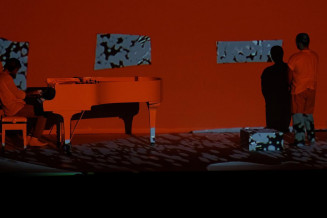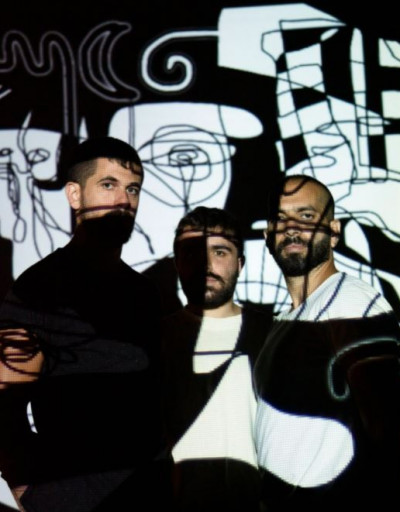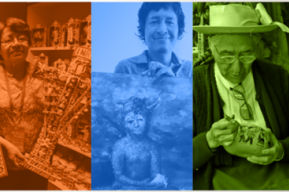Nothing could have predicted that this cold and peaceful night of February would be disturbed by painful thoughts, nor that the walls of the historic Al-Bustan hotel, on the hill of Beit Mery, would be invaded by echoes of the drama of 4 August, 2020. If the trauma is all too vivid in the minds of the Lebanese who survived the explosions at the port, Vladimir Kurumilian, Alaa Minawi and Ahmed Amer, were still able to revive gaping wounds, through their singular spectacle. Entitled "That Breath We Held", the artistic performance imagined and presented by these three young Lebanese artists within the framework of the Al-Bustan International Festival and supported by UNESCO’s Li Beirut initiative, combines music, narrative and image, to ask the following question: “How can we expire again?”
The concept is unique. Having asked the audience members to tell anonymously how they experienced 4 August 2020, days before the show, the trio reinterprets these confidences in their own way. As Alaa Minawi reads snatches of these testimonies in a minimalist setting, his voice disappears at times to drown in the music improvised by Vladimir Kurumilian on the piano, and the illustrations of Ahmed Amer, sketched live and enlarged on stage, transform the decor and captivate the spirits. We hear the story of this mother, distraught at not having her children near her before finding them with a neighbor. Or that of this young man stuck in an underground supermarket and unable to find the exit after the explosion. The music, on the other hand, marries the stories, and the colors gravitate, through various forms that lengthen and merge before disappearing.

If the public holds their breath between one story and another, when they are asked to share their thoughts at the end of the show for a last interactive number, the words burst out everywhere: “Criminals! “Justice” “We will not forget”. The question-and-answer session that follows is marked by painful confidences. Those of a young man who saw all his colleagues die, or those of an older man who says: "They want to change the identity of Lebanon but we won't let them."
This unique and poignant performance is part of the very first partnership between the Education Sector at the UNESCO Regional Office in Beirut and the al-Bustan International Festival. It aims to revive the spirit of the capital and spread messages of hope and confidence to citizens and young people, but also to promote psychosocial support for students affected by the double explosion at the port, through a selection of performances, but also side activities involving the schools of Li Beirut.

“Throughout the Li Beirut initiative, and as we move from an immediate response to the tragedy to more strategic and sustained interventions, we are pleased to join our efforts with the al-Bustan Festival to reach students and young people in Lebanon, especially those who were affected by the explosion, says Maysoun Chehab, UNESCO National Programme Officer for Education in Lebanon. The goal is to help them cope with the adversity of the multiple crises we are facing. »
These remarks are reiterated by Laura Lahoud, vice-president of the al-Bustan Festival, who assures: “The partnership with UNESCO encourages us enormously. That UNESCO believes in this festival, which is above all educational, proves that we are on the right track. This 28th edition of the festival called Reconnect is a gift for our country. It marks a recovery after a short absence imposed by the crisis, but we had no choice but to organize the festival this year. When the challenges grow, we hold our ground more firmly. We refuse to give up. It is a cultural resistance that we need because Lebanon must remain a space of education, communication and creation”.
Li Beirut is an international flagship initiative launched from Beirut by the Director-General of UNESCO, Audrey Azoulay, in the aftermath of the explosions, on August 27, 2020, to support the rehabilitation of schools, historic heritage buildings, museums, galleries and the creative industry, all of which suffered significant damage in the deadly explosions.
Since the Al Bustan Festival was founded in 1994, it has established in Lebanon a unique and unprecedented tradition of a music season in winter. The founders wished to revive the cultural life of a country reemerging after seventeen years of war. The Festival has indeed reached its objective, presenting each year more than thirty performances over a five-week period in February and March. With a predominance of chamber music, the Festival also includes opera, orchestral concerts, choral concerts, dance, marionettes and theatre. The Al Bustan Festival is a member of the European Festival Association (EFA) and the International Society for the Performing Arts (ISPA).






